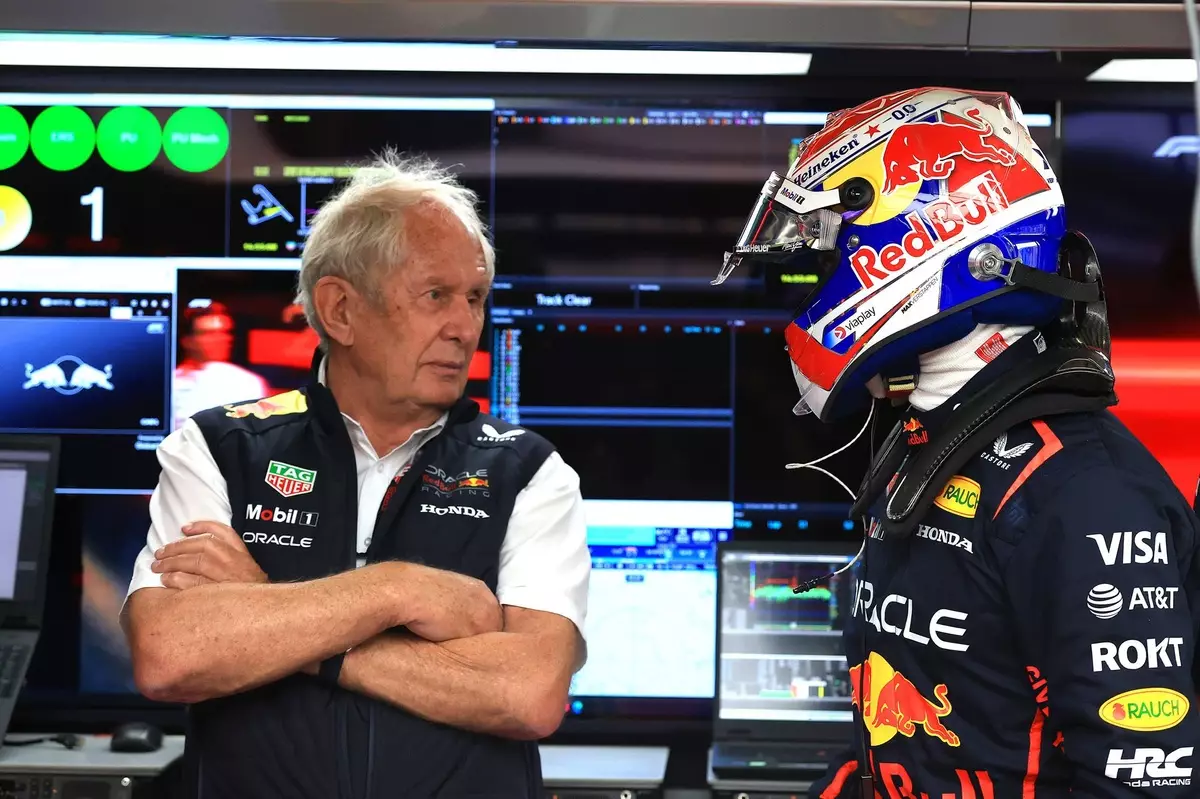The Spanish Grand Prix this year was a spectacle of speed and tension that ultimately culminated in an unexpected and turbulent finish for Max Verstappen. As one of the leading figures in Formula 1 today, Verstappen’s decision making on the track has often been a topic of discussion. However, during the final laps of this race, viewers were treated to what Red Bull’s advisor, Helmut Marko, rightfully described as an unraveling of focus and judgment that left many spectators—and perhaps even Verstappen himself—bewildered.
During lap 61, following a safety car restart, Verstappen found himself in a precarious position when he lost third place to Ferrari’s Charles Leclerc. This was described as the “decisive moment” where the Dutchman’s emotions began to eclipse his rational thinking, a phenomenon that is as dangerous as it is fascinating in high-stakes racing. The term “chaos” hardly captures the pandemonium that ensued; it was the pressure of competition meeting human fallibility.
The Triggering Events
Marko pointed out that Verstappen was intensely aware of the racing regulations but still managed to get embroiled in a conflict with George Russell—a situation aggravated by the circumstances surrounding the restart. The interpretation of the incident involving Leclerc was certainly contentious. Marko’s assertion that Leclerc “drove into Max’s car” raises questions about the subjective nature of such encounters in racing and how quickly emotions can cloud judgment.
The ensuing clash with Russell was not simply a reckless move; it was emblematic of Verstappen’s mental state at that moment. Initially lifting off the throttle, he appeared to be allowing Russell through—an apparent nod to sportsmanship—only to suddenly accelerate again. Marko’s bewilderment reflects a broader concern in motorsport: the complexity of psychological pressure during races and how that pressure can distort rational thinking in the heat of competition.
A Catastrophic Decision
The consequences of Verstappen’s misjudgments were severe. A 10-second penalty was more than just a disciplinary action; it symbolized a deeper crisis of control that many drivers face. The weight of such penalties, especially following a restart, can be overwhelming, veering a competitor from a podium finish to an inconsequential place in the standings. Verstappen’s eventual finish of 10th place was not just a misstep; it was a serious setback for a driver who is usually so composed and strategically minded.
Marko’s remarks that “it was unnecessary, and a lot of points were lost” resonate deeply within the fierce competition of Formula 1. The stakes are enormous, and a single moment of emotional surrender can have long-lasting effects on both standings and reputations. In an ecosystem where every point counts towards ultimate glory, Verstappen’s impulsive actions speak to a razor-thin margin between victory and defeat.
The Emotional Aftermath
The culmination of frustration resulted in an apology from Verstappen—a noteworthy moment for someone who typically embodies confidence bordering on defiance. Acknowledging that his unsportsmanlike conduct during the race should not have transpired adds a layer of complexity to his character as an elite athlete. It’s as if the weight of the moment pushed him to briefly step outside his hardened persona.
However, Marko’s acknowledgment of Verstappen’s heated demeanor during post-race discussions provides insight into the culture of high-stakes racing, where emotions often intensify after events. Red Bull wisely chose to forgo an exhaustive debrief that night, understanding that cooling off was necessary in the wake of such events. This decision emphasizes the greater need for emotional management in a sport that perpetually operates on the edge of chaos.
The Road Ahead
Ultimately, Verstappen’s experience in the Spanish Grand Prix serves as a powerful reminder of the human side of racing. The pressure to perform at the highest level can lead even the best drivers to moments of weakness. It opens up an important dialogue about how teams and athletes can better prepare for high-pressure situations and the importance of emotional intelligence within the sport. This incident will surely shape future discussions surrounding driver conduct, penalties, and the delicate balance between competition and sportsmanship in the electrifying world of Formula 1.

